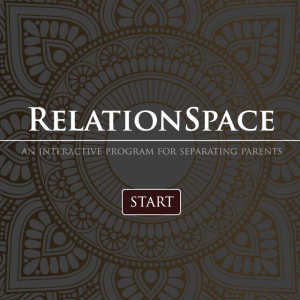Overview
This enrolment grants you access to Part 1-3 (the first half) of the RelationSpace Online Program. You will need to purchase access to and complete Part 4-6 ( the second half) in order to obtain a Certificate of Completion. You cannot obtain access to Part 4-6 without completing Part 1-3 first.
Learning outcomes
Part 1: Introduction and You
- Reasons why engagement in the program is important and relevant;
- Common roadblocks to commitment to a behavioural change experience;
- Learning new skills requires alertness, acceptance of critical feedback and challenging sceptical thoughts;
- Considere reflections on others who describe their experiences of separation;
- Challenge established thought patterns in order for individual actions to become more flexible, helpful and adaptable.
Part 2: Looking after yourself
- Learn to improve self-care and enhance effective parenting capacity at a time when the child needs it most;
- Use focused strategies around thinking as a way to manage intense emotions and to improve reaction behaviours to stressful situations;
- Understand common negative self-talk patterns and learn ways to manage them;
- Practice re-framing techniques and shift to more positive, solution-based thinking;
- Learn cognitive and behavioural strategies for moderating intense emotions;
- Learn the effects of anger on a separation; explore common myths about anger and identify ways to manage anger in yourself and others;
- Consider how to adopt behaviours and cognitions to help reduce and manage stress;
- Reflect on a bigger picture view to assist with managing perspectives and expectations for yourself and others;
- Downloaded worksheets on Negative thoughts, Managing Anger and Emotions Wheel.
Part 3: Your children
- Learn how divorce affects children, what is normal and what is not normal for children at each age and stage of their development; Learnt to use the frequency, severity and duration tool;
- Common myths about children and divorce and learn how you can minimise harm;
- Increase awareness about your child’s attachment needs, relationships and temperament strengths and vulnerabilities;
- Learn ways to help your child adjust to the changes in their family, households and routines and practiced new tools to assist them to cope;
- Observe, review and practice new ways to communicate with your child in their new family circumstances to improve their future psychological wellbeing;
- Identify transition challenges, consider the ways in which your child observes you as a model of ways to behave and respond;
- Learn strategies on how to tell your child you are going to separate from their other parent; watch a best practice model and learnt ways to remedy a less than ideal outcome;
- Observe, learn and practise positive coaching skills; how to recognise when a child is having difficulties, and how you can coach your child towards recovery and resilience;
- Download worksheets on children & stress and how to tell the children about divorce


